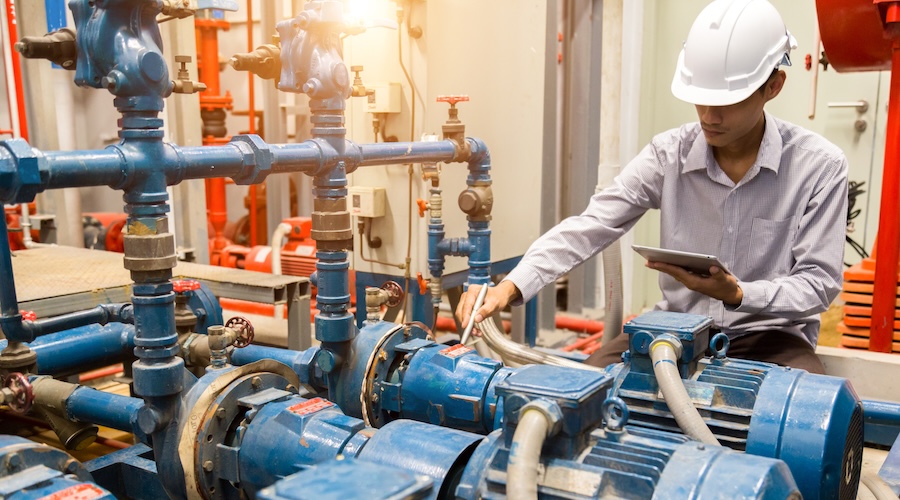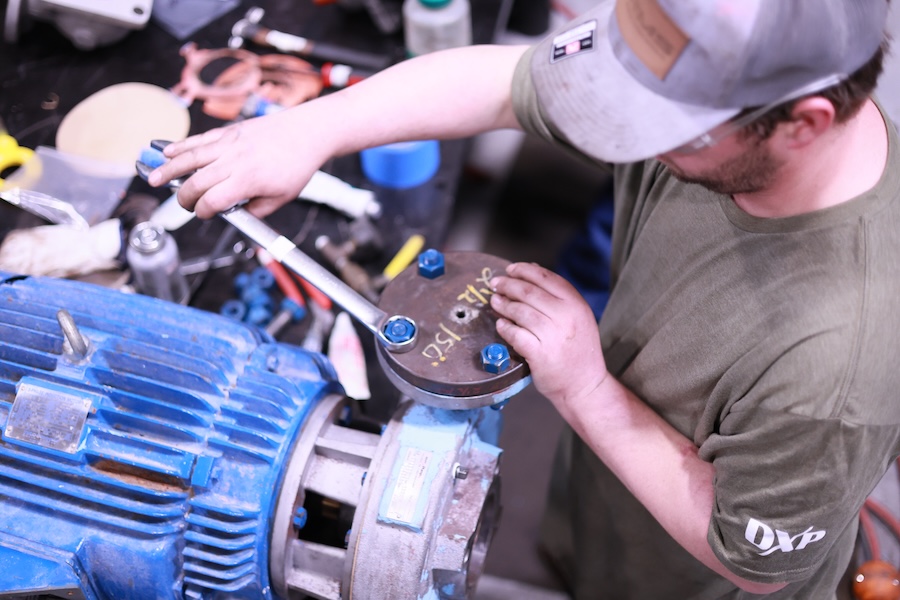
Pump Maintenance and Repair in Industrial Systems
When your pumps stop working, everything around them slows down or stops completely. These interruptions lead to delays, waste, and lost revenue. Yet, industrial pumps are often overlooked until something fails.
Taking care of pumps on a regular basis keeps them operating efficiently and using less energy, not to mention helps prevent unexpected shutdowns. In this guide we’ll cover all the basics of pump maintenance and repair.
What Often Goes Wrong with Pump Maintenance
Waiting for a failure before taking action often leads to longer downtime and higher repair costs. In some cases, teams misdiagnose the issue (replacing parts that aren’t the actual cause) which results in repeat failures.
Another common issue is poor or missing maintenance records. Without reliable data, it’s hard to plan service, recognize patterns, or spot early warning signs. These small gaps can turn into large disruptions if left unchecked.
Building a Practical Pump Maintenance Plan
A forward-thinking approach helps prevent wear and identify problems early.
- Scheduled inspections: Routine visual checks help spot leaks, corrosion, or loose fittings before they become larger issues.
- Lubrication and cleaning: Keeping parts clean and properly lubricated prevents wear and supports better operation.
- Vibration analysis: Monitoring vibration patterns helps detect misalignment or imbalance early.
- Thermal imaging: Heat patterns reveal potential issues with friction, motor overload, or internal blockages.
- Component tracking: Recording the use and wear of parts like seals, bearings, and impellers allows replacements to happen at the right time.
- Condition-based service planning: Using collected data, teams can time maintenance around pump performance trends instead of fixed intervals.

DXP’s Approach to Pump Maintenance and Repair
Our goal is to make pump service one less thing you have to worry about. So we’ve built our approach to be steady, practical, and dependable!
Field Service and OEM Expertise
Our pump field service technicians are experienced with all major OEM brands. We know how pumps support your facility, and we’re equipped to service them quickly and reliably when the need arises.
Full Bearing Repair and Rotating Equipment Support
We offer complete bearing repair services as part of our broader support for rotating equipment, helping all components perform as intended.
Remanufactured Pumps
Our team remanufactures pumps using used industrial components or hydraulically re-rates them to meet specific application needs. These rebuilt pumps often perform better than OEM versions.
Pump Rerates and Upgrades
When application conditions change, pumps can fall out of sync with what your process demands. Our engineers can redesign and modify pumps to operate more efficiently under new flow, pressure, or reliability targets. These rerates and upgrades help reduce wear, lower energy use, and improve run times.
In-House Testing Facilities
DXP’s Texas and Louisiana pump testing facilities follow national standards and can handle many pump types. Customers can also observe tests remotely via live video.
Preventive and Predictive Maintenance
As we mentioned earlier in the section “Building a Practical Pump Maintenance Plan,” we provide structured maintenance plans that include scheduled inspections, vibration monitoring, thermal checks, and other condition-based assessments. These services help reduce downtime by addressing wear and performance concerns early. Our predictive capabilities let you plan maintenance based on trends and data, not estimates.
24/7 Service Centers Nationwide
DXP operates pump service and repair centers across the country with expert staff available around the clock to support your operations. Our teams are ready to handle any pump, anywhere.
Frequently Asked Questions on Pump Maintenance and Repair
How often should industrial pumps be serviced?
Service frequency depends on usage, environment, and pump type. Most systems benefit from monthly visual checks and semi-annual or annual inspections by a technician.
What are signs a pump needs repair?
Watch for reduced flow, pressure drops, leaks, unusual noises, increased vibration, or overheating. These usually indicate internal wear or alignment issues.
Is it better to repair or replace a worn-out pump?
It depends on the condition, age, and repair cost. In many cases, remanufacturing or rerating offers better value than full replacement, especially if the pump housing is still in good shape.
Can I get support for older or less common pump models?
Yes. DXP’s field and repair teams work with industrial pumps from all major OEMs, including legacy or hard-to-source models.
What does predictive maintenance actually involve?
It includes condition monitoring tools like vibration analysis, infrared thermography, and oil analysis to detect early wear or faults before they cause failures.
Do you offer on-site pump repairs?
Yes. Our field service teams can travel to your location with the equipment and expertise to service pumps without needing to remove them from the system.
How do I start working with DXP for pump maintenance?
We recommend starting with a site assessment or service consultation. From there, we can develop a maintenance plan or schedule service as needed.
Let DXP Help You Protect Your Pumps
When your operations rely on pumps, downtime impacts productivity, safety, profitability, and so on. Fortunately, DXP’s experience and well-equipped facilities will keep your pumps running!
If you need routine maintenance, emergency repair, system upgrades, or a full rebuild, DXP can support you. Our pump repair team works with all types of industrial pumping systems, and we don’t just fix problems, but we also help you avoid them in the first place.
Let DXP be your partner in pump maintenance and repair! Contact us today to get started.

